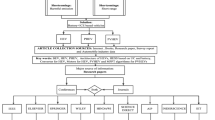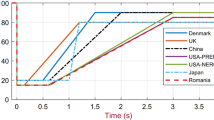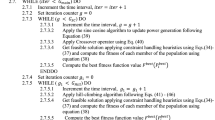Abstract
Improvements in fuel consumption and emissions of hybrid electric vehicle (HEV) heavily depend upon an efficient energy management strategy (EMS). This paper presents an optimizing fuzzy control strategy of parallel hybrid electric vehicle employing a quantum chaotic pigeon-inspired optimization (QCPIO) algorithm. In this approach, the torque of the engine and the motor is assigned by a fuzzy torque distribution controller which is based on the battery state of charge (SoC) and the required torque of the hybrid powertrain. The rules and membership functions of the fuzzy torque distribution controller are optimized simultaneously through the use of QCPIO algorithm. The simulation ground on ADVISOR demonstrates that this EMS improves fuel economy more effectually than original fuzzy and PSO_Fuzzy EMS.
Similar content being viewed by others
References
Johnson V H, Wipke K B, Rausen D J. HEV control strategy for realtime optimization of fuel economy and emissions. McCarthy, 2000, 1: 1543–1557
Park J. Development of equivalent fuel consumption minimization strategy for hybrid electric vehicles. Int J Automotive Tech, 2012, 13: 835–843
Patil R M, Filipi Z, Fathy H K. Comparison of supervisory control strategies for series plug-in hybrid electric vehicle powertrains through dynamic programming. IEEE T Contr Syst T, 2014, 22: 502–509
Zou Y, Liu T, Sun F, et al. Comparative study of dynamic programming and Pontryagin’s minimum principle on energy management for a parallel hybrid electric vehicle. Energies, 2013, 6: 2305–2318
Borhan H, Vahidi A, Phillips A M, et al. MPC-based energy management of a power-split hybrid electric vehicle. IEEE T Contr Syst T, 2012, 20: 593–603
Xia C, Zhang C. Power management strategy of hybrid electric vehicles based on quadratic performance index. Energies, 2015, 8: 12458–12473
Lee H D, Sul S K. Fuzzy-logic-based torque control strategy for parallel- type hybrid electric vehicle. IEEE T Indust Electr, 1998, 45: 625–632
Pu J H, Yin C L, Zhang J W. Fuzzy torque control strategy for parallel hybrid electronic vehicles. Int J Automotive Tech, 2005, 6: 529–536
Xing J, He H W, Zhang X W. Genetic-fuzzy HEV control strategy based on driving cycle recognition. High Tech Lett, 2010, 16: 39–44
Zhou M L, Lu D K, Li W M, et al. Optimized fuzzy logic control strategy for parallel hybrid electric vehicle based on genetic algorithm. Appl Mech Mater, 2013, 274: 345–349
Wu J, Zhang C H, Cui N X. Fuzzy energy management strategy for a hybrid electric vehicle based on driving cycle recognition. Int J Automotive Tech, 2012, 13: 1159–1167
Su Y X, Chi R. Multi-objective particle swarm-differential evolution algorithm. Neural Comput Appl, 2015, doi: 10.1007/s00521-015-2073-y
Murphey Y L, Chen Z H, Kiliaris L, et al. Intelligent power management in a vehicular system with multiple power sources. Power Sources, 2011, 196: 835–846
Sun Y, Chen Z, Yan B J, et al. A learning method for energy optimization of the plug-in hybrid electric bus. Sci China Tech Sci, 2015, 58: 1242–1249
Wu J, Zhang C H, Cui N X. PSO algorithm-based parameter optimization for HEV powertrain and its control strategy. Int J Automotive Tech, 2008, 9: 53–69
Duan H B, Qiao P. Pigeon-inspired optimization: A new swarm intelligence optimizer for air robot path planning. Int J Intell Comput Cybern, 2014, 7: 24–37
Guilford T, Roberts S, Biro D. Positional entropy during pigeon homing II: Navigational interpretation of Bayesian latent state models. J Theor Biol, 2004, 227: 25–38
Mora C, Davison C, Wild J, et al. Magnetoreception and its trigeminal mediation in the homing pigeon. Nature, 2004, 432: 508–511
AI A N. New dimensions in non-classical neural computing, part II: Quantum, nano, and optical. Int J Intell Comput Cybern, 2008, 2: 513–573
Jeong Y W, Park J B, Jang S H, et al. A new quantum-inspired binary PSO: Application to unit commitment problems for power systems. IEEE T Power Syst, 2010, 25: 1486–1495
Liao X, Zhou J, Ouyang S, et al. An adaptive chaotic artificial bee colony algorithm for short-term hydrothermal generation scheduling. Int J Elect Power, 2013, 53: 34–42
Tavazoei M S, Haeri M. Comparison of different one-dimensional maps as chaotic search pattern in chaos optimization algorithms. Appl Mat Comput, 2007, 187: 1076–1085
Yuan X, Wang P, Yuan Y, et al. A new quantum inspired chaotic artificial bee colony algorithm for optimal power flow problem. Energy Conv Manag, 2015, 100: 1–9
Author information
Authors and Affiliations
Corresponding author
Rights and permissions
About this article
Cite this article
Pei, J., Su, Y. & Zhang, D. Fuzzy energy management strategy for parallel HEV based on pigeon-inspired optimization algorithm. Sci. China Technol. Sci. 60, 425–433 (2017). https://doi.org/10.1007/s11431-016-0485-8
Received:
Accepted:
Published:
Issue Date:
DOI: https://doi.org/10.1007/s11431-016-0485-8




